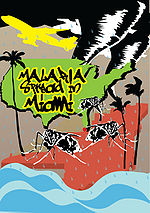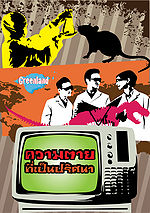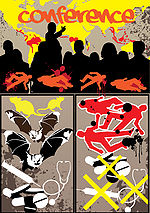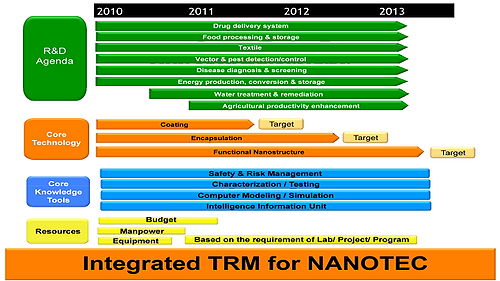APEC Center for Technology Foresight
From FORwiki
Established as a project of the Industrial Science and Technology Working Group (ISTWG) in 1998, and hosted by the National Science and Technology Development Agency, the APEC Center for Technology Foresight aims to develop and diffuse foresight capability and leading edge planning tools to prepare APEC Economies for rapid change and major societal challanges through:
- APEC-wide foresight projects
- Regional, sectoral, and orgnaizational foresight
- State-of-the-art foresight training
- National and regional strategy planning
From 2009 onwards, the center has been hosted by the National Science Technology and Innovation Policy Office (STI).
Contents |
APEC-CTF projects
Roadmapping Converging Technologies to Combat Emerging Infectious Diseases
In 2006, the Center proposed a project “Roadmapping Converging Technologies to Combat Emerging Infectious Diseases” to The Industrial Science and Technology Working Group of APEC (APEC ISTWG), upon prior consultation with the APEC Health Task Force (now Health Working Group) early that year. This project aims to enhance the region’s capacity in using converging technologies to contribute to the prevention and management of emerging infectious diseases that could become widespread in the APEC region. The methods chosen were bibliometric analysis, online survey, scenarios and technology roadmapping.
In the first stage, after review and scoping by bibliometric analysis and online survey, the project developed scenarios in order to identify a group of technology applications that have high impact to combat EIDs. Then in the second stage through workshops in Japan and Chinese Taipei in 2007 experts in various technological areas throughout APEC were invited to jointly build roadmaps of these technologies.
The final symposium was arranged in Bangkok Thailand, December 2007. Participants were 90 APEC experts across many disciplines: academics, policy makers, technologists, NGOs, and representatives from the private sector. where the project findings were reported and discussed. Throughout the project many kinds of challenges in developing and using these converging technologies across the region were identified. It was also identified that certain types of networking and collaboration, under the strong commitment to share experience by all the players in the region will be the key success factor in combating EIDs.
The project was very successful in getting good quality expertise from across the APEC region and even from relevant organizations outside APEC. There was enormous information received from the 4 events: the scenario workshop, two technology roadmapping workshops, and one final symposium. In order to make significant application of the knowledge from the project, the project report was designed according to the EID life cycle model proposed by Dr. Richard Silberglitt at the Scenario Workshop, together with results from the six technology roadmaps developed during the project. Experts who represent different areas of expertise and who actually participated and contributed to the project at different times were then carefully chosen to participate in the writing of the final report.
An authors meeting was arranged in Bangkok, Thailand in June 2008 to allow authors to discuss the progress of each chapter. The full report was then edited and completed afterward. The full report of the project was published in November 2008. It was then distributed to the stakeholders for consideration and further usage in policy making process. The booklet in Thai version was in preparation. It describes scenarios, EID life cycle model, the contribution of technologies in combating EIDs, and suggestions on post-foresight activities. Moreover, the result of the project was presented to The Senate Standing Committee on Public Health on March 13th, 2009.
Futures of Low Carbon Society: Climate Change and Strategies for Economies in APEC Beyond 2050
This project was proposed to APEC ISTWG by APEC Center for Technology Foresight, Thailand and co-sponsored by Hong Kong, China; Japan; P.R. China; Viet Nam; Philippines; Brunei Darussalam; Chinese Taipei; USA; and Korea. The purpose of this project is to conduct a region-wide foresight research on the future society where low carbon economy and adaptive lifestyle becomes the principal driver governing trade and development. A Delphi survey and workshop are adopted to formulate future scenarios for the Asia-Pacific region that illustrate social, economical and political demand. Science and technology developments, including technology transfer, that respond to such demand will be discussed in the subsequent workshop. The expected outcome includes short, middle, and long term strategies for the region in technological development.
The scoping workshop organized in collaboration with the University of Hong Kong in Hong Kong, China during 13 -14 August, 2008. The workshop has been arranged in roundtable-style meeting between key members and an observer from APEC economies (P.R. China; Hong Kong, China; Japan; Republic of Korea; Malaysia; New Zealand; Philippines; Chinese Taipei; Thailand; Vietnam; and Macao, China). The meeting was organized to discuss the project strategies and to set the scope for the subsequent activities. The participants agreed with the keyword “Low Carbon Society or LCS” and focus on personal lifestyle and social systems, international trade, economic systems, effective governance (political stability and international cohesion), furthermore adaptation include not only science and technology but also social and economic or socioeconomic adaptation.
The international working group meeting was organized in Bangkok during 13-14 Oct 08 with the active contribution from working group members. There were altogether 40 participants repersenting key members from APEC economies (Chinese Taipei; P.R. China; Macao, China; Republic of Korea; Russia; Viet Nam; Hong Kong, China; Philippines; and Thailand). The survey statements were classified into 5 core categories, namely, Climate change & its impacts, Migration, rural life & natural resources, Society/health, Trade of goods & services and Housing & construction/urban life/transportation. Under each category there were 4-9 Delphi statements and each statement had its own sub-questions. This is a significant progress towards the completion of Real-Time (RT) Delphi survey.
Five Thai Working Group Roundtable Meetings were held to make futher structural adjustment and detailed refinement on Delphi statements and their questions. The process took a few months of discussions and deliberations to complete the RT Delphi statements. Then we were ready to launch the survey online during June 15 - August 30, 2009.
RT Delphi Survey was to gather opinions from a wide range of experts in the APEC region to provide initial inputs for the future scenarios. RT-Delphi Survey is roundless. Participated experts can answer the questions as many times as they like and can observe the results so fas as well as comments from other participants in real time. Anonimity is maintained in the sense that no one knows who elas is participating and who gave which answer. The results from RT Delphi survey analysis were used as an input in the Low Carbon Society Scenario Workshop.
The Low Carbon Society Scenario Workshop aimed to identify main socio-economic drivers relevant and derived from climate change. It is to establish the likelihood of low-carbon society and generate momentous essences for possible scenarios of adaptive lifestyle beyond 2050 in the 5 areas asa mention above. The workshop brought together 50 of Asia Pacific's key expets from a variety of disciplines to take part in a three-day exercise in Phuket from 2-4 November 2009.
In the workshop, the participants were divided into 5 groups to discuss the 5 aspects of LCS identified via the RT Delphi suvery.
○ Climate change & its impacts — The world becomes more predictable as advances in climate modeling technology provide greater certainty when projecting climate trends and their impacts. By 2050, modeling accuracy increases to 98-100% due to a 10,000-fold expansion in computer processing power. More accurate and reliable forecasting information allows policy makers and the public to better prepare for the longer-term changes caused by the changing climate. …
○ Housing and construction/urban lifestyle/transportation — Technological advances are critical drivers to low-carbon solutions for urban areas. Artificial intelligence grows in importance allowing computers to manager a greater percentage of complex task. The use of nanotechnology fo manufacturing of personal goos like clothing, and for air and water filtration, will become widespread contributing to reductions in emissions related to transportation logistics. Technological advances will also continue to fuel improved wellness ans healthcare, and growth in personalized medicine. …
○ Migration, rural life and natural resources — Land zoning plays a critical role in assuring the rural communities maintain a compeititve land advantage for food production. Sustainable agricultural productivity becomes the norm, enhanced by a high level of education among farmers, and their commitment to "computerized farming" and other technological advances. …
○ Society and health — National gevernments have limited success in demonstrating an ability to react quickly to critical issuesaffecting the planet. Instead, significant social and economic transformation towards a LCS occurs at sub-national levels becauce of initiatives undertaken by individuals, communities, villages, businesses (small and medium) and even actions from the street. …
○ Trading of goods and services — Ninety percent of Asia Pacific's energy needs are fed by renewable sources such as solar, algae and geothermal. Nuclear fusin has become a realistic energy sources. Providers of goods and services stress their commitment to green production techniques, energy efficiency and clean transportation. Their is a decoupling of economic growth from environmental impacts. APEC citizens now require the environment tp become a beneficiary, not a casualty, of economic growth.
The participants also recommended several other posiible mechanisms for regional linkages e.g. climate modeling data sharing and transferring, a regional network of "Center of R&D Excellence" etc.
A technology foresight symposium on Towards Low-Carbon Society in Asia-Pacific Beyond 2050, held in Bangkok during January 27-28, 2010, was the final stage of the project. The symposium aimed to build on 2-year long intensive studies and discussed longer-term perspective to enhance the region's capacity in development and utilization of resources as well as technologies and innovation that contribute to successful transition to the forthcoming low-carbon society. a number of selected experts, scientists, technologists, foresight specialists as well as policy and decision makers in the Asia-Pacific region were invited to participate in this symposium to share their expertise and cooperate in developing the regional low-carbon future.
Future Fuel Technology
Foresighting Future Fuel Technology was an APEC-wide foresight project that the Center finished in 2005, with a summary report published in 2006. A paper was presented at the Seville Future-Oriented Technology Analysis (FTA) Seminar in 2006 and a brief report of the project was published in the European Foresight Monitoring Network (EFMN) in 2007 (Foresight Brief No. 105). Several articles based on the findings of the project was published locally, including a recent publication of a short article in October 2008 in Science in Action magazine (Volume 4, Number 6), published by NSTDA .
Thailand's Nanotechnology Roadmapping
APEC CTF facilitated The Center for Nanotechnology (NANOTEC), National Science and Technology development Agency (NSTDA) in constructing the Thailand’s Nanotechnology Roadmap. The process included revisiting the National Nanotechnology Strategic Plan (2007-2013 and Master Plan (2007-2011), analyzing global nanoscience and nanotechnology trends using bibliometric analysis and literature review and scrutinizing NANOTEC resource and capacity.
The roadmap was constructed based on a template consisting of 4 layers, i.e. resources, core knowledge tools, core technology and R&D agenda. With inputs from NANOTEC personnel and executive, the suggestions were raised that the roadmap should not only serve the national strategic plan and master plan, but also be considered by various units and stakeholders, such as NANOTEC Central Laboratory, NANOTEC extramural funding, and NANOTEC Center of Excellence, for implementation during 2010 - 2013.
The roadmap was constructed and submitted to the NANOTEC executive board as shown below. The board approved the Nanotechnology Roadmap on Aug 8th, 2009. It would be an instrumental for charting direction of NANOTEC and Thailand Nanotechnology for the next few years. The NANOTEC board also noted that it was, and would always be, a work-in-progress.
In addition to the roadmap, a guideline booklet is under preparation in order to facilitate the launching process. It is hoped that the units of NANOTEC will further refine the TRM according to their tasks and use it as a policy guideline.
Technology Roadmap for Thai Biomarkers Research
APEC CTF has assisted and facilitated many technology roadmapping (TRM) activities for R&D programs and to formulate strategic alliance with partners in organizations and industrial sectors. Based on the findings from the previous APEC-wide foresight project DNA Analysis for Human Health in the Post-Genomic Era (2003), the Center worked with the Thai Biomarkers Research Program during May – July 2008, and produced a draft technology roadmap for the research program. The Center continues to assist the program by introducing patent mapping method, using the software Matheo, in developing patent maps for the specific research area of cancer biomarkers. The program also utilized another technology foresight method, bibliometric analysis, to further explore the research trend in the field. These insights are used by the research program in guiding its research direction towards the development of genetic test kits for diagnosis/prognosis, and support its research funding decision in the future.
Trainings
Foresight training for the Parliament
APEC CTF regularly organizes comprehensive training workshop on foresight to promote the foresight methods for organizations to apply in their organizational strategies. In 2009, the Thai parliament foresight training workshop was set up for 4 sessions and held on April 7 th and 24 th ,May 15 th and 29 th at Thailand parliament office. A total of 32 participants were senior officers who will be promoted to be an executive. The workshop started with a lecture to introduce foresight methods such as scenario planning and Delphi. The participants then had an opportunity to practice Real-Time Delphi and scenario planning on Thailand parliament office in 2019. The results of the workshop showed that the participants were capable of thinking about future, understanding foresight methods and applying to their personal projects.
Technology Roadmapping Training Workshop 2008
In 2008, a comprehensive training workshop on technology roadmapping was held on 28th, 30th April and 8th May at Century Park Hotel in Bangkok, Thailand. The title of the training course was “Comprehensive Training to Build a Technology Roadmap for Your Organization” The content of this training workshop includes:
- The conceptual thinking approach for technology roadmap that consisted of its values to organization, applications and cases practice.
- Competitive Intelligence in organization
- Patent Analysis
There were four organizations (20 persons) attended the training workshop. They were from 1 private and 3 NSTDA organizations: The Siam Research and Development Co., Ltd., ASTEC (Assistive Technology) and TIDI (Thailand IC Design and Innovation Laboratory) under National Electronics and Computer Technology Center, and Cluster and Program Management Office of NSTDA.
Training Course on Foresight for Organization of the Islamic Conference (OIC) Members
Dr. Nares Damrongchai, Executive Director of CTF, was invited to lead a training course at OIC Standing Committee on Scientific and Technological Cooperation (COMSTECH) in Islamabad, Pakistan, during 2-6 July 2008. More than 40 participants from OIC countries attended the training to build key concepts about the objectives and methods of technology foresight with some case studies and hands-on assignments. The course was followed by a video conference course in the subsequent week (7-11 July 2008) led by PREST, UK to reinforce earlier developed concepts. In October 2008, the Center received an invitation from COMSTECH to make another visit and conduct a 2-week foresight course in January 2009.
Training on Patent Mapping
APEC CTF realizes the importance of technology analysis especially using patent mapping as a tool to reinforce Technology Roadmapping. Hence in order to build capacity in Patent Mapping, CTF has studied the possibility of using Patent Mapping software of several brands. Finally in January 2008, NSTDA purchased 3 licenses of 1-year valid Matheo Patent Software, to start having the Center and NSTDA researchers and analysts try out the program. However since the Center and NSTDA has little experience with Patent Mapping, without intense training, the software will not give real benefit. We then set up two training programs as followed.
- Workshop on Technique of Patent filing, IP management, and Patent Mapping
By Mr. Takao Ogiya, Senior Examiner, Japan Patent Office 19-20, 23-24 June 2008 at the Thailand Science Park, NSTDA Participants: any interested NSTDA employees, 45 persons.
- Workshop on Patent Mapping and Matheo Software
By Mr. Pramote Thammarat, consultant on Patent Mapping 8, 29 October 2008 at the Thailand Science Park, NSTDA Participants: Specific groups of NSTDA researchers and analysts, 35 persons Four Technology Groups: Bio-Marker, Active Packaging, Screen Printing, Solar Cell
Both events were funded by NSTDA funding. Results of the workshops brought attention to NSTDA executives in using the tool to analyse technology and to build more capacity within NSTDA on this issue. CTF staff have obtained more knowledge and skill in Patent Mapping to analyse technology gap and therefore reinforced its Technology Roadmapping method.
Consultancies in APEC Economy
National Science and Technology Development Agency (NSTDA) foresight
APEC-CTF helped designing and facilitating a scenario planning workshop for NSTDA. The workshop held on September 7,2009. The objective of this workshop was to generate a set of future scenarios focusing on NSTDA’s balanced score card to re-design the organizational strategies in the next 10 years. A total of 71 participants from many departments attended this workshop to have a brainstorming discussion to create the scenario on the assigned issues such as stakeholders, partnership, internal manpower, internal process, core technology, benchmarking and external source of funds. Seven scenarios with invaluable information and opinions of NSTDA’s staff were developed and delivered to the executive to formulate the organizational strategies.
Design Thailand with Foresight
After the World Economic and Financial Crisis, Thailand was also impacted by this crisis. Knowledge Network Institute of Thailand (KNIT) decided to create scenario of Thailand after the crisis. APEC-CTF was requested to work as a team with KNIT to design and facilitate a scenario planning workshop for the "Design Thailand 2019". This project had 3 workshops and were attended by participants with rich experiences in various fields. The first workshop held on February 28 - March 1 ,2009 with 24 participants who had seniority. The second one held on July 31 - August 1, 2009 with 34 participants who were in the middle life. The third one held on September 20-21,2009 with 33 participants who were teenager or young adult. This was a very successful project that could develop 10 scenarios. Many people and organization were interested in the output of the workshop. Now there is a working group of ThaiPBS, APEC-CTF, KNIT and academics to deliver Thailand scenario 2019 via the ThaiPBS's TV program.
APEC-CTF's wiki
The wiki system was introduced by Science and Technology Knowledge Services (STKS), NSTDA in 2008 and has been adopted since then by the center as one of many tools for knowledge management. The system has been employed in many projects ranging from foresight research, foresight training, documents/publications deposition, national science and technology policy formulation, manpower/infrastructure plan development, public STI forum, to personal space.
Wiki team and support
Dr. Nares Damrongchai, the executive director of the center, has been overseen and provided suggestions on maintenance and improvement of the wiki. Dr. Suchat Udomspagit is the administrator, ensuring a consistent wiki structure with support from STKS, NSTDA.
Participants/Users
The system is designed as an internal space for STI staff. Therefore the client/outsider is not involved in the design of the system. However, there are some exceptional cases especially those actively involve in the development of some STI's or APEC-CTF's projects.
Main difficulty
The STI office and APEC CTF staff are encouraged to use the wiki as part of their routine works, on voluntary basis. They are free to upload files onto the system such as published articles, e-books, meeting minutes, interview notes, presentation files, roadmaps, scenarios etc. This is based on the information sharing basis. In addition, some sections of wiki possess discussion areas in order for the staff to exchange their opinions. However, there is low participation rate which might be due to willingness in sharing information of some person. Syntax is also a major obstacle for some people in using wiki.
External links
- APEC-CTF home page
- Low Carbon Society Beyond 2050 home page







